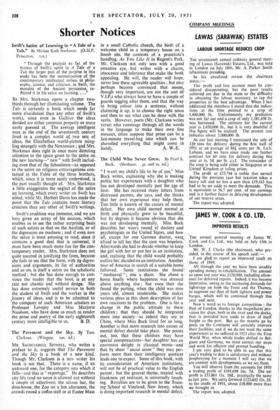Shorter Notices " Through the analysis so far of the
themes of Swift's satire in A Tale of a Tub the larger part of the purpose in this study has been the reconstruction of the contemporary intellectual milieu, in philo- sophy, science, and criticism, as Swift, the moralist of the Ancient persuasion, re- flected it in his satire on learning...."
So Mrs. Starkman opens a chapter two- thirds through her illuminating volume. The Tale is certainly a book which needs far more elucidation than any other of Swift's works, since even in Gulliver the ideas- derided are either common property or more easily guessed at. The average intelligent man at the end of the seventeenth century lived in a complex world of two sets of ideas, the Elizabethan world-picture ming- ling strangely with the Newtonian ; and Mrs. Starkman does right in once more directing attention to the space given to the satire on the new learning—" new " with Swift includ- ing even that of the Schoolmen—as opposed to the satire on religious extravagations con- tained in the Fable of the three brothers, which, since it is more easily understood, is the part usually thought of. Mrs. Starkman a little exaggerates the neglect of the satire on learning, which every writer on Swift has noted, while Mr. Herbert Davis has made the point that the Tale contains more literary criticism than any other of Swift's writings.
Swift's erudition was immense, and we are here given an array of his sources, which enables us to see the rather surprising basis of such satires as that on the Aeolists, or of the digression on madness ; and if even now the satire is most amusing to read, since it contains a good deal that is universal, it must have been much more fun for the con- temporary reader. Mrs. Starkman does not quite succeed in justifying the form, because she fails to see that the form, with it digres- sions and arguments, its list of authorities and so on, is itself a satire on the scholastic method ; but she has done enough to con- vince the reader that the book is at_ any rate not chaotic and without design. She has done extremely useful service to both the student of Swift and the worker in the history of ideas, and is to be admitted to the company of such American scholars as Professor Lovejoy and Miss Marjorie Nicolson, who have done so much to render the prose and poetry of the early eighteenth century more intelligible to us. B. D.


































 Previous page
Previous page